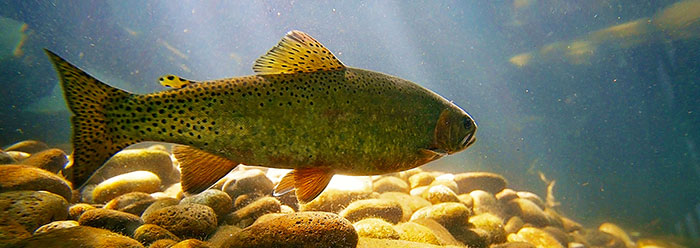A person who sees a trout swimming in a stream may casually think the fish needs only water, food, and a mate with which to reproduce. Yet even fish have more than these physical needs. Similarly, because evolutionists are bent on materialistic thinking, whether studying fish or man, they often simply misdiagnose what a creature’s real needs are.
What Are Basic Needs for Fish?
Freshwater fish ecologist Mark Everard displays overly simplistic analysis when he summarizes the essential habitat needs of freshwater fish as being food, flight, and fertility.1 Without question, fish need food. Likewise, fish need to reproduce successfully at some population level to survive from generation to generation. The ability to flee from predators is also a critical need for survival. But are these obvious physical needs all there is to life, even for a humble fish?
For starters, fish need high-quality water to survive. Fish habitat waters must contain adequate dissolved oxygen, and the water pollutants must be at a tolerable minimum.1,2 But there’s more.
Fish need to know what is happening around them and how to relate to it. Like us, fish need accurate data about the world around them—constantly provided by light sensors, chemoreceptors, temperature detectors, etc.—so they can react to threats and opportunities.1,2,3 Fish constantly interact with living and nonliving entities: aquatic animals and plants, microbes and toxins, predators, parasites, and poisons.3,4 These encounters involve sensor and immune systems that blend as an integrated interface-management system for symbiotic activities that include preprogrammed responses that can be offensive, defensive, or mutualistic.2,3,4
In other words, fish need accurate information, and a robust set of abilities to act on it in order to thrive—that means fish must possess traits and abilities specifically installed by their Creator. But materialists’ simplistic thinking tends to ignore or discount the fascinating information programmed within a fish’s biological makeup.
What Are Basic Needs for People?
Unsurprisingly, thriving as a human requires more than food, shelter, and the biogenetic aspects of family life. But for humans the need beyond the physical is at an entirely different level from animals because we are made in God’s image—the crown of His creation (Psalm 8:4-5).
Because we bear His image and have souls and spirits, materialistic thinking fails miserably to provide us with an accurate analysis of the human condition. Our need for God is desperate. Christ Himself said, “It is written, ‘Man shall not live by bread alone, but by every word that proceeds from the mouth of God.’ ”5
Certainly, we need food, water, air, shelter, and reproduction. But we need far more. We need God-provided information. We need God’s very revelation to rightly relate with Him and our fellow man and the world He has placed around us. That need for truth from God’s mouth applies to our critical here-and-now needs and more importantly to our needs hereafter, because the truth is that we are sinners in need of salvation. A simplistic materialistic-only perspective misses the boat because we desperately need eternal truth—valuable truth that God alone can give us.5
Yes, our physical bodies’ immune systems require accurate information about physical microbes and toxins.4,6 Yet even more so, our souls and spirits need reliable spiritual truth about God, creation, life, death, sin, right versus wrong, true versus false, salvation, and how to best live this earthly life. We need revelation from God…every word that proceeds from His mouth.5
References
- Everard, M. 2015. River Habitats for Coarse Fish: How Fish Use Rivers and How We Can Help Them. Sheffield, UK: Old Pond Publishers, 5-6, 15-24.
- Giller, P. S., and B. Malmqvist. 2008. Chapters 1, 2, 3, and 9 in The Biology of Streams and Rivers. Oxford, UK: Oxford University Press. See also Giles, N. 1994. Freshwater Fish of the British Isles. London: Swan Hill Press, 13-17, 34-38, 119-124, 145-165, 168-178.
- Barger, M. A., and G. W. Esch. 2001. Downstream Changes in the Composition of the Parasite Community of Fishes in an Appalachian Stream. Journal of Parasitology. 87 (2): 250-255.
- Bergman, J., and N. O’Sullivan. 2008. Did Immune System Antibody Diversity Evolve? Journal of Creation. 22 (2): 92-96.
- Matthew 4:4, quoting Deuteronomy 8:3. See also Hosea 4:6 and Amos 8:11.
- Guliuzza, R. J., and F. Sherwin. 2015. Does our Immune System Indicate Disease Before the Fall? Acts & Facts. 44 (1): 17. See also Guliuzza, R. J. 2009. Made in His Image: Immune Systems, The Body’s Security Force. Acts & Facts. 38 (11): 10-11.
* Dr. Johnson is Associate Professor of Apologetics and Chief Academic Officer at the Institute for Creation Research.








